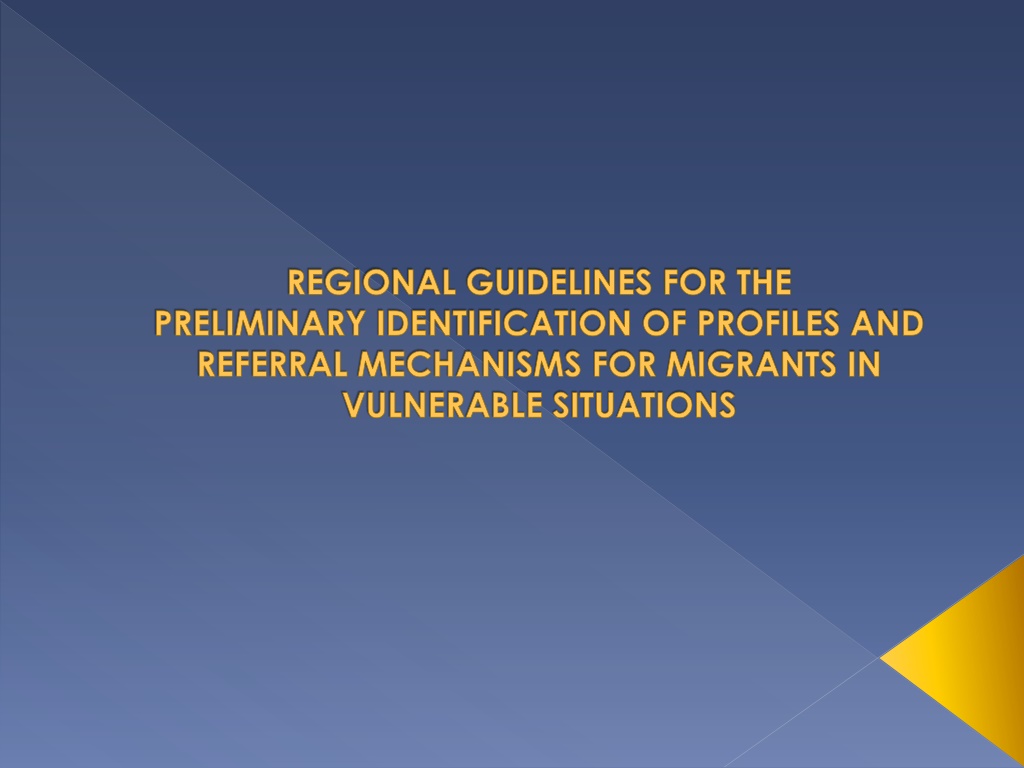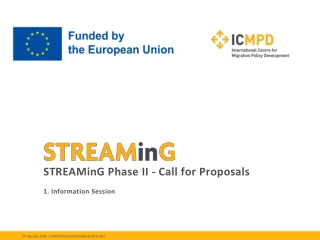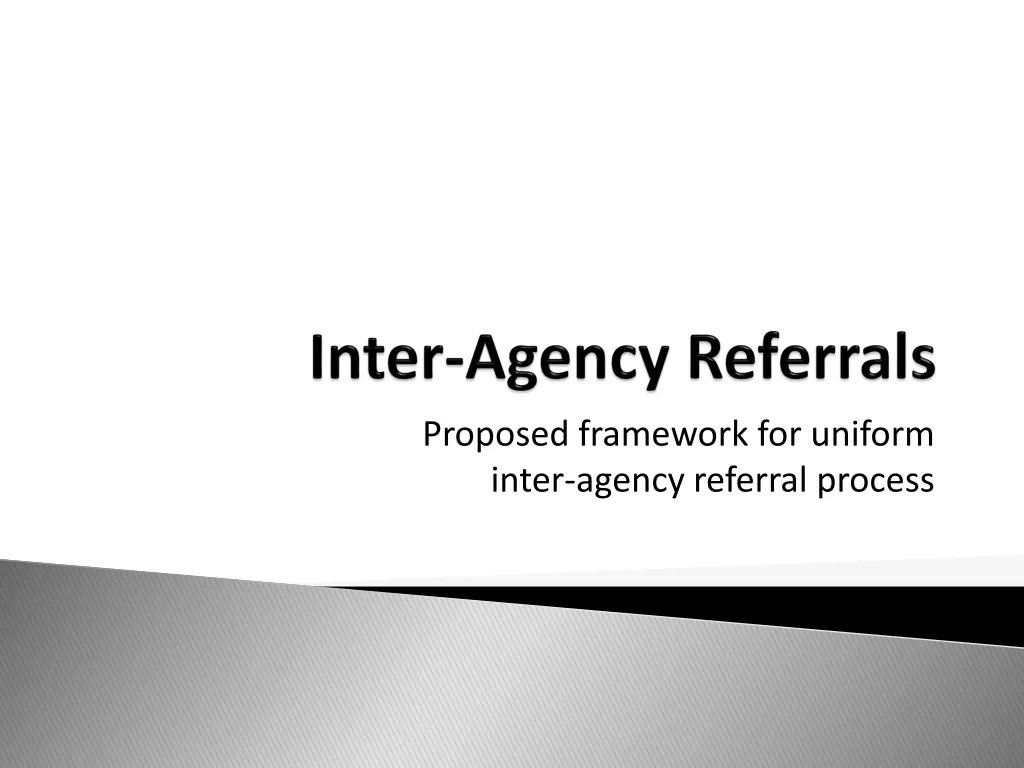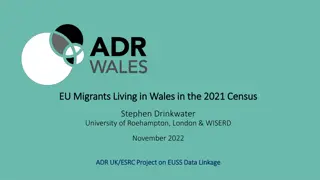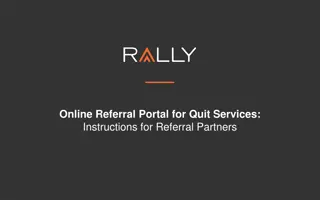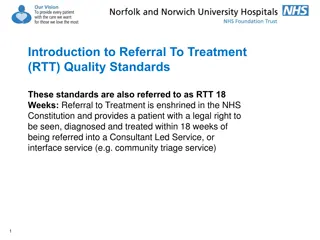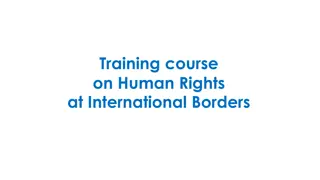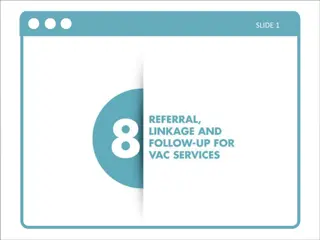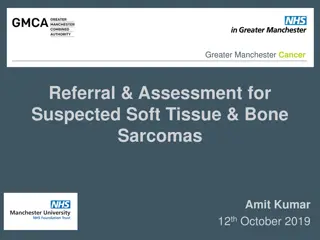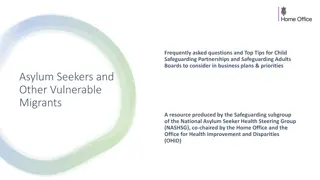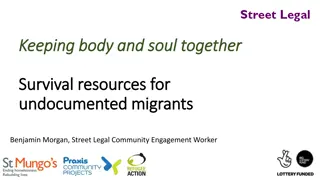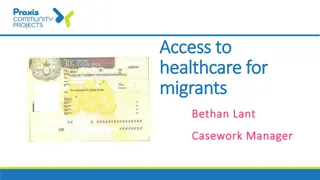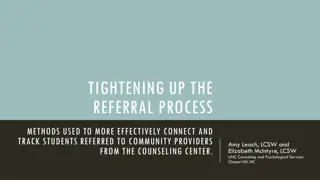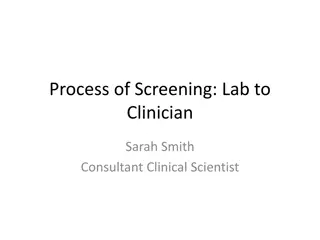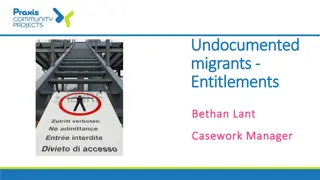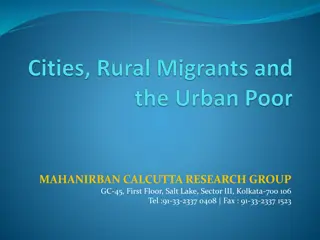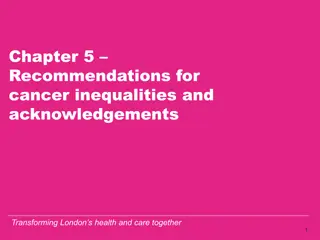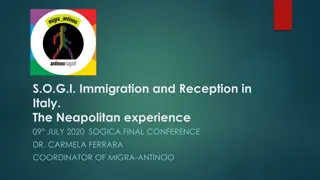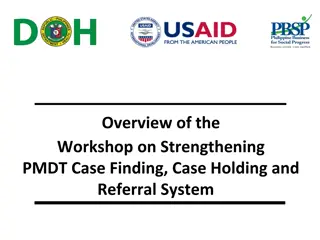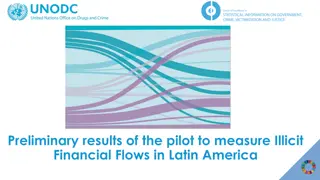Guidelines for Preliminary Identification and Referral Mechanisms for Migrants in Vulnerable Situations
Regional guidelines emphasize the importance of providing protection to migrants in vulnerable situations while respecting their human rights. Technical support from IOM and UNHCR is crucial in identifying and referring vulnerable migrant populations. National workshops have been conducted to enhance the capacity in identifying migrant populations in vulnerable situations, including asylum seekers and refugees.
Download Presentation

Please find below an Image/Link to download the presentation.
The content on the website is provided AS IS for your information and personal use only. It may not be sold, licensed, or shared on other websites without obtaining consent from the author. Download presentation by click this link. If you encounter any issues during the download, it is possible that the publisher has removed the file from their server.
E N D
Presentation Transcript
REGIONAL GUIDELINES FOR THE PRELIMINARY IDENTIFICATION OF PROFILES AND REFERRAL MECHANISMS FOR MIGRANTS IN VULNERABLE SITUATIONS
BACKGROUND The obligation of States to provide protection to migrants in vulnerable situations, irrespective of their migration status and with full respect for their human rights.
BACKGROUND Within this context, technical support was requested from IOM and UNHCR to strengthen the process of detecting, identifying, and referring migrant populations in vulnerable situations, understanding that this is the first step in the process of providing the required protection and assistance.
BACKGROUND In 2011, a process that included in its first stage the implementation four national workshops named Capacity-building on Identification of Migrant Populations ins Vulnerable Situations, including Asylum Seekers and Refugees, within the Context of Mixed Migration Flows .
COUNTRIES NICARAGUA Nicaragua: August 29-31, with participation of 22 representatives from the following institutions: General Directorate of Migration Ministry of Foreign Affairs Mi Familia, Red de Migrantes National Police Force Jesuit Services for Migrants Ministry of the Interior Coalition Against Trafficking in Persons Office for Women s Rights Human Rights Ombudsman s Office Save the Children The Army of Nicaragua
HONDURAS Honduras: September 7-8, 2011 with participation of 24 representatives of the following institutions: General Directorate of Migration Secretariat of Justice and Human Rights DNSEI Conadeh Honduran Institute for Children and Family Casa Alianza Ministry of Foreign Affairs CIPRODEH National Police Force
EL SALVADOR El Salvador: September 12-14, 2011 with participation of 21 representatives from the following institutions: National Civil Police Force General Directorate of Migration The Red Cross ISNA IAES UNHCR Agency Ministry of Foreign Affairs ISDEMU C ritas El Salvador Human Rights Ombudsman s Office
COSTA RICA Costa Rica: September 26-28, 2011with participation of 19 representatives from the following institutions: National Children s Board General Directorate of Migration Ministry of Foreign Affairs Casa de Derechos - UNHCR Scalabrinian Sisters
RESULTS FROM WORKSHOPS A national assessment of advances and challenges in preliminary identification and referral mechanisms, as well as assistance and protection services Indicators established for each vulnerability profile An instrument for the preliminary identification of profiles validated
SECOND PHASE Costa Rica, May 22-23, 2012 A Consultation meeting on the development of regional guidelines for the preliminary identification of profiles and referral of migrants in vulnerable situations was held.
PARTICIPATING COUNTRIES Second Phase Directorates of Migration of Costa Rica, Nicaragua, El Salvador, Mexico, Guatemala, Panama, and Honduras Ministries of Foreign Affairs of El Salvador, Honduras, Nicaragua, and Guatemala National Police Force of El Salvador NGOs of Mexico and Honduras Ombudsman s Office of Costa Rica National Women s Institute of Costa Rica
OBJECTIVE To provide Member States with general guidelines for the development and implementation of mechanisms for the preliminary identification of profiles and referral of migrants in vulnerable situations.
GUIDELINE IMPLEMENTATION SPHERES Will orient the procedures of all institutions that are directly or indirectly involved in the matter.
GUIDING PRINCIPLES FOR INTERVENTIONS Principles of International Law on Human Rights, Refugees, and Humanitarian Law Principle of equality and non-discrimination, especially discrimination based on gender, nationality, ethnic group, or sexual orientation Principle of special protection for boys, girls, and adolescents and ensuring the Child s Best Interest Principle of confidentiality Principle of non-re-victimization Principle of respect for diversity and multiculturalism And especially, international instruments on protection of the human rights of migrants
PRELIMINARY IDENTIFICATION OF PROFILES Detection Meeting urgent needs Ensuring appropriate conditions for the interview Providing information to the migrant Assessing if an imminent danger exists Conducting an identification interview to determine the profile
PROFILES Profile of victim or potential victim of trafficking in persons Profile of unaccompanied and/or separated migrant boy, girl, or adolescent Profile of potential refugee/refugee status applicant Profile of migrant in a situation of risk
REFERRAL FOR SPECIFIC PROTECTION AND ASSISTANCE Applying a category of migration protection or personal status to prevent rejection, refoulement, or deportation Meeting immediate basic needs, if required: food, clothes, shelter, personal hygiene, etc.
FOLLOW-UP ON REFERRED CASES Submitting information to the relevant unit within the institution Communicating immediately after referral to verify if the person has arrived at the place of referral Providing any additional information requested by the institutions in charge of the person
BASIC REQUIREMENTS FOR IMPLEMENTATION To establish protocols or routes for inter- institutional coordination To provide training and dissemination To maintain an updated directory of resources To promote binational and regional agreements facilitating assistance and protection To develop practical follow-up mechanisms
APPENDIX A guide for conducting the interview and recording information
PROPOSED ACTIONS A review by each country To provide a term of one month for submitting comments If comments are not received, a positive answer will be assumed At least three countries should work on the comments regarding the Guidelines To be submitted for approval at the following meeting
THANK YOU The countries that have developed these Guidelines REQUEST YOUR COMMITMENT TO THIS IMPORTANT EFFORT.
